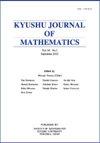多变量FROBENIUS集上的加权SYLVESTER和
IF 0.5
4区 数学
Q3 MATHEMATICS
引用次数: 16
摘要
给定正整数a1,在gcd(a1,…,ak)=1的情况下,众所周知,所有足够大的n都可以表示为a1,…的非负整数组合,ak。Frobenius问题是确定不可表示为互质的给定正整数的非负整数组合的最大正整数(参见[15]的一般参考文献)。这个数用g(a1,…,ak)表示,通常被称为弗罗贝尼乌斯数。Frobenius问题也被称为硬币交换问题(或邮票问题/麦乐鸡问题)本文章由计算机程序翻译,如有差异,请以英文原文为准。
WEIGHTED SYLVESTER SUMS ON THE FROBENIUS SET IN MORE VARIABLES
Given positive integers a1, . . . , ak with gcd(a1, . . . , ak) = 1, it is well-known that all sufficiently large n can be represented as a nonnegative integer combination of a1, . . . , ak. The Frobenius Problem is to determine the largest positive integer that is NOT representable as a nonnegative integer combination of given positive integers that are coprime (see [15] for general references). This number is denoted by g(a1, . . . , ak) and often called Frobenius number. The Frobenius Problem has been also known as the Coin Exchange Problem (or Postage Stamp Problem / Chicken McNugget Problem), which
求助全文
通过发布文献求助,成功后即可免费获取论文全文。
去求助
来源期刊
CiteScore
0.80
自引率
0.00%
发文量
10
审稿时长
>12 weeks
期刊介绍:
The Kyushu Journal of Mathematics is an academic journal in mathematics, published by the Faculty of Mathematics at Kyushu University since 1941. It publishes selected research papers in pure and applied mathematics. One volume, published each year, consists of two issues, approximately 20 articles and 400 pages in total.
More than 500 copies of the journal are distributed through exchange contracts between mathematical journals, and available at many universities, institutes and libraries around the world. The on-line version of the journal is published at "Jstage" (an aggregator for e-journals), where all the articles published by the journal since 1995 are accessible freely through the Internet.

 求助内容:
求助内容: 应助结果提醒方式:
应助结果提醒方式:


